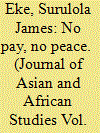|
|
|
Sort Order |
|
|
|
Items / Page
|
|
|
|
|
|
|
| Srl | Item |
| 1 |
ID:
142004


|
|
|
|
|
| Summary/Abstract |
Contrary to mainstream thinking, the existence of diversity does not necessarily condemn a state to instability and chaos. In fact, difference is a good ingredient for progress because each group contributes its unique experiences and peculiar qualities to the cause of a nation. To produce crisis, diversity must be worked on or manipulated. With a view to gaining deeper understanding of the factors that impact on identity diversity to create conflict in Nigeria, a number of conflict theatres in the country were examined. Having explored each case, the article notes that the policies of the colonial state, that emphasised group differentiation, laid the foundation for identity conflicts. The post-colonial state is just as guilty. Its administrative arrangement for managing diversity, the federal character principle (FCP), has failed to exploit the country’s diversity to produce development. Instead, it has deepened the isolation of certain groups, thus, inhibiting national integration. Added to the deliberate manipulation of diversity for personal interests by the political class, the incidence of identity conflicts in the country can be explained. Going forward, the author stresses the need to review the FCP and close all loopholes in its enabling laws that allow for easy misinterpretation and deliberate misapplication.
|
|
|
|
|
|
|
|
|
|
|
|
|
|
|
|
| 2 |
ID:
142036


|
|
|
|
|
| Summary/Abstract |
Boko Haram (BH) is an insurgent group that operates mainly in northeastern Nigeria. Its stated aim is to establish an Islamic state, and it employs terrorism as its strategy. Earlier interests of security analysts centred on the drivers of BH uprising and the possibility of its internationalisation. Today's concerns relate more to why the rebellion has lasted this long. In toeing the same line, this article demonstrates that BH is a purposive terror group against which the government has evolved no viable strategy. It examines some gains of BH over the past six years and how it benefitted from the government's underestimation of its capacity and determination. It concludes that to effectively engage BH, the Nigerian government must revaluate its threat and sincerely pursue an expanded strategy beyond the current military-centric approach. To be effective, government's response must be packaged in such a way as to enhance human security in the region.
|
|
|
|
|
|
|
|
|
|
|
|
|
|
|
|
| 3 |
ID:
142523


|
|
|
|
|
| Summary/Abstract |
The peace accord between the Federal Government of Nigeria and the Niger Delta (ND) militants, within the framework of the 2009 amnesty programme, immediately yielded positive results. Daily oil production, which had drastically declined to an all time low of 1.4 million barrels, soon shot up to 2.2 million barrels as the deal restored relative calm in the region. In recent times, however, the seeming peace in the region has disappeared, to the consternation of those who had touted a DDR approach to the conflict in Nigeria’s oil ‘republic’. Kidnapping, for ransom in the region, shifted from high profile abduction to anyone in society that can offer a price. More than any other explanation, this article locates the resurgence of violence in the region in the fault lines of the DDR programme implemented in 2009. The author contends that the deal was a ‘cash for peace’ programme cloaked in ‘amnesty’; which has inadvertently created a violence appeal for those who seek a slice of the so-called ‘national cake’.
|
|
|
|
|
|
|
|
|
|
|
|
|
|
|
|
|
|
|
|
|